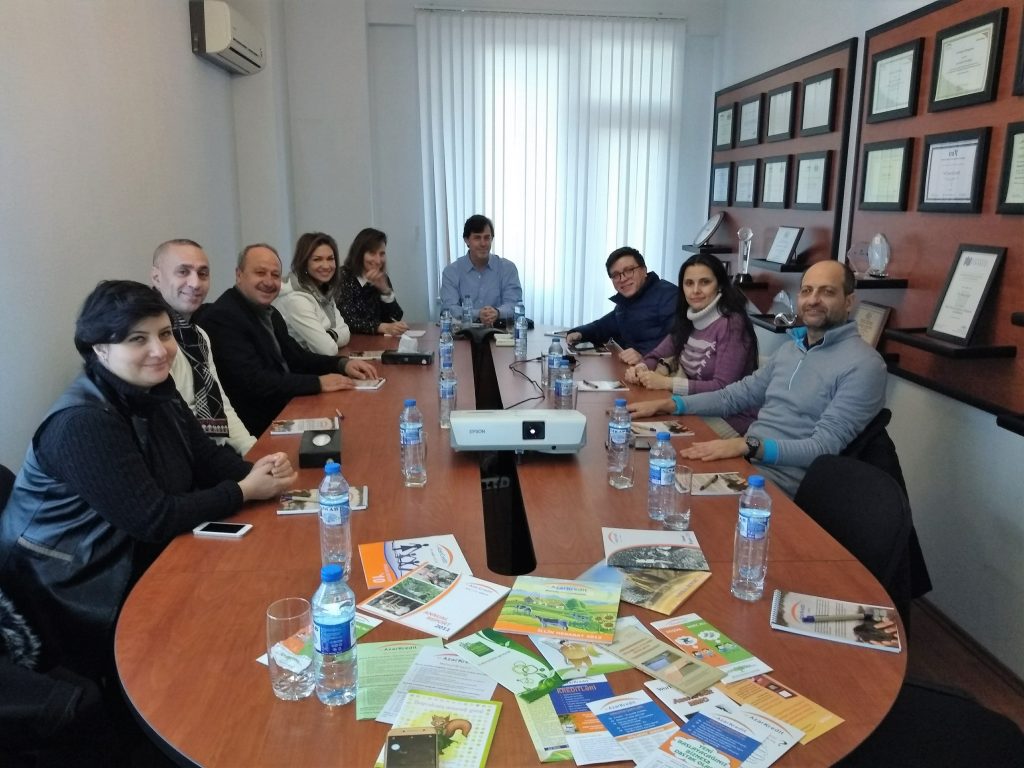Feb 16, 2018 | by Sonya Salanti
Building a strong, effective and member-oriented microfinance association (MFA) is no easy feat. MFAs must address complex organizational challenges--such as building strong governance structures, ensuring financial sustainability and developing innovative services--all while serving the unique needs of members in the inclusive finance market.
A peer exchange facilitated through a field visit is the perfect opportunity for MFA board members and staff to learn from others’ experience and bring back best practices to their home association. As part of the SEEP Network’s role in extending capacity building services through the Livelihoods and Inclusive Finance (LIFE) program, such an opportunity was presented to the staff and board members of the Lebanese Microfinance Association (LMFA). On January 14, four LMFA board member representatives, two LMFA staff and one member of the LIFE team took to the air from Beirut and landed in Baku for a three-day peer exchange, hosted by the Azerbaijan Microfinance Association (AMFA), a valuable member of SEEP.
Left to Right: Jhaleh Hajiyeva, AMFA Executive Director; Ola Hariri, LMFA Communications Manager; Patrick Connors (in back), SEEP Consultant; Sonya Salanti, SEEP Sr. Program Manager; Ilda Nahas, LMFA Board Member; Elshan Pirmaliyev, AMFA Chairman of the Board; Najwa Rahal, LMFA Program Manager; Hassan Nassir, LMFA Board Representative; Chady Rached, LMFA Board Member
Jhaleh Hajiyeva, Executive Director, AMFA and Vusala Garayeva, Project Manager served the role of primary facilitators throughout the exchange. The visit’s agenda was designed to provide LMFA participants with an overview of an MFA’s key priorities and AMFA’s experience and perspective on best practices. A range of sessions over the course of three days exposed participants to topics such as Effective Governance, Association Services, Membership Strategies, Financial and Operational Sustainability as well as the Role of Associations in Policy Advocacy.
Teymur Heybatov, Financial Sector Specialist at the International Finance Corporation (IFC) presented on Digital Financial Inclusion, a specific topic of interest to many microfinance institutions (MFIs) and MFAs are looking to increase accessibility to services by leveraging advances in ICT for financial inclusion.
Learning during the exchange was not limited to workshop-style sessions. Lebanese participants visited two of AMFA’s members: AzerCredit, a microfinance institution and Bank of Baku, a commercial bank.
AzerCredit provided an overview of their products, services and business model, allowing MFA members to compare and contrast lending and operational practices within their own MFIs. AzerCredit also shared examples of how AMFA supports their operations through policy advocacy, connections with investors, development of promotional materials and market studies. Sharing this information provided LMFA with first-hand exposure to value-added services that MFAs can provide to members. The visit to a rural branch of the Bank of Baku highlighted approaches commercial banks can take to provide micro-lending services to vulnerable populations using a high-touch personalized approach. This visit demonstrated that MFAs can diversify membership to include commercial banks with a social mission.
AMFA also scheduled meetings with financial regulators at the Central Bank of Azerbaijan. Through discussion and experience sharing, participants gained insight into how AMFAengages with regulators to positively influence the policy and regulatory environment for microfinance on behalf of members.
A highlight of the exchange was a tour of the World Carpets Association, a project in the Guba region of Azerbaijan, where Association Chair, Mrs. Fatima Aghamirzayeva trains women in the traditional craft of Azeri carpet weaving. The visit highlighted ways in which an MFA forms connections with small enterprises that are beneficiaries of micro-credit and financial inclusion practices.
The final evening of the exchange visit was enjoyed by all participants with a festive celebration dinner, marked with toasts, singing, dancing and a traditional multi-course Azeri dinner—not necessarily in that order.

Left to Right: Vusala Garayeva, AMFA Project Manager; Abed Moukadem, LMFA Board Member Representative; Hassan Nasser, LMFA Board Member Representative; Ilda Nahas, LMFA Board Member; Najwa Rahal, LMFA Program Manager; Patrick Connors, SEEP Consultant; Ali Hijazi, LIFE Training Coordinator; Ola Hariri, LMFA Communications Manager; Chady Rached, LMFA Board Member
Reflecting on the visit, participants expressed a sincere appreciation of the complexities of association development. Here are a few key takeaways from the exchange:
The LMFA staff was represented by Najwa Rahal, Program Manager and Ola Hariri, Communications Manager. The LMFA board was represented by Abed Mouqadem, Operations Manager and Board Member Representative from Al Majmoua; Ilda Nahas, Executive Director of the Entrepreneurial Development Foundation and Treasurer; Chady Rached, President of Associate D’Entraide Professionnelle (Professional Mutual Association); and Hassan Nassir, Field Officer at the Association for the Development of Rural Capacities.
Sonya Salanti is Senior Program Manager, Resilient Markets at the SEEP Network.
The USAID-funded LIFE project, a program under Palladium, is designed to link vulnerable entrepreneurs at the bottom of the economic pyramid with business training and financial services, improving livelihoods, creating jobs, and reducing poverty while facilitating growth and consolidation of the microfinance sector in Lebanon. A core component of the program is inclusive finance. LMFA is a key player in advancing the financial inclusion agenda for the Lebanese microfinance sector.
Categories: Microfinance MENA Consumer Protection Resilient Markets English Unpublished Resources Blog Published Blogs/Webinars Resilient Markets Blog Resources WebinarsBlogs

1621 North Kent Street, Ste 900,
Arlington, VA, 22209
P 202.534.1400
F 703.276.1433
Website Photos: © mari matsuri
